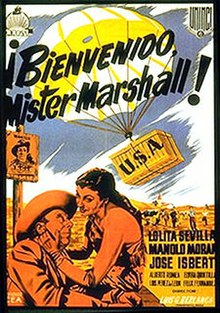Welcome Mr. Marshall!
| Welcome Mr. Marshall! | |
|---|---|

Theatrical release poster by Francisco Fernández Zarza
|
|
| Directed by | Luis García Berlanga |
| Produced by | Vicente Sempere |
| Written by |
Juan Antonio Bardem Luis García Berlanga Miguel Mihura |
| Starring |
José Isbert Manolo Morán Lolita Sevilla |
| Music by | Jesús García Leoz |
| Cinematography | Manuel Berenguer |
| Edited by | Pepita Orduña |
|
Release date
|
|
|
Running time
|
95 minutes |
| Country | Spain |
| Language | Spanish |
Welcome Mr. Marshall! (Spanish: ¡Bienvenido, Mister Marshall!) is a 1953 Spanish comedy film directed by Luis García Berlanga and considered one of the masterpieces of Spanish cinema. The film highlights the stereotypes held by both the Spanish and the Americans regarding the culture of the other, as well as displays social criticism of 1950s Spain (showing a typical Spanish village, with typical inhabitants: a priest, the majority of the population that are peasants, the mayor, and a hidalgo).
The film was entered into the 1953 Cannes Film Festival.
A small Spanish town, Villar del Río is alerted to an upcoming visit of American diplomats; the town begins preparations to impress the American visitors, in the hopes of benefiting under the Marshall Plan. Hoping to demonstrate the side of Spanish culture with which the visiting American officials will be most accustomed, the citizens don unfamiliar Andalusian costumes, hire a renowned flamenco performer, and redecorate their town in Andalusian style. A flamenco impresario (Manolo Morán) who spent time in Boston advises the locals to think of what they will ask from the Americans.
On the eve of the Americans' visit, three of the central characters dream of stereotypical American culture and history, based uniquely on their lives and experiences. The mayor dreams of a Western-like bar brawl, the hidalgo dreams of the arrival of a conquistador on New World shores, and the priest sees the hoods of a Holy Week procession turn into Klansmen dragging him before the Committee on Un-American Activities accompanied by jazz music. Also, a poorer man dreams that the Americans, shown as the Three Kings, fly over his field and parachute a new tractor into his field.
...
Wikipedia
